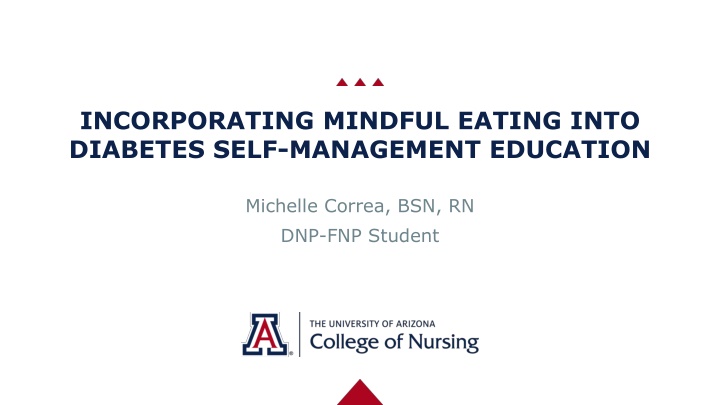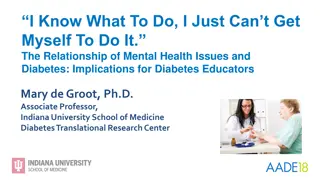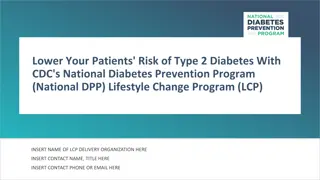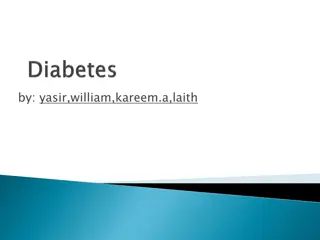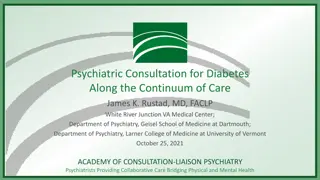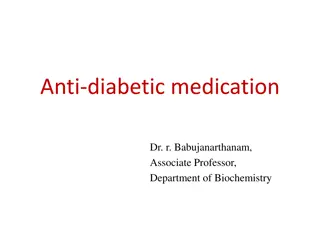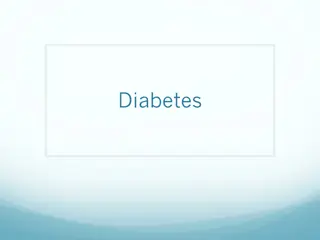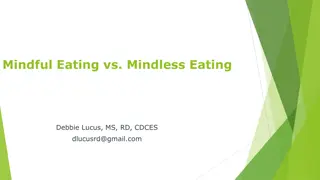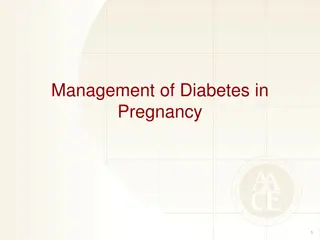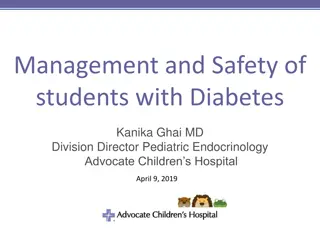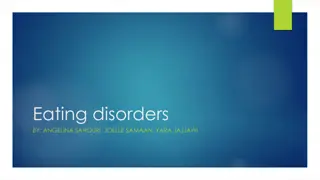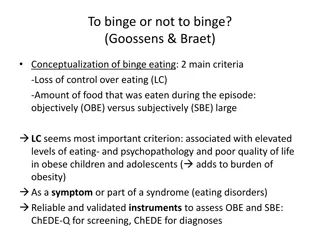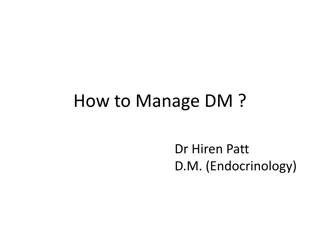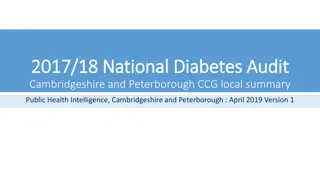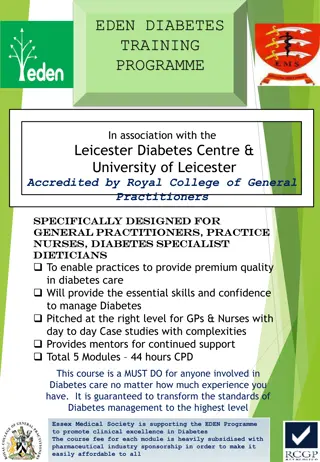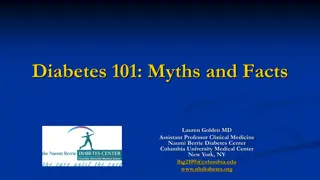Mindful Eating for Diabetes Self-Management
Incorporating mindful eating into diabetes self-management education is crucial for individuals with type 2 diabetes. Mindful eating practices can help improve awareness of eating habits, prevent overeating, and promote a healthier relationship with food. This approach emphasizes respecting cultural foods, avoiding labeling foods as good or bad, and embracing a Health at Every Size perspective. By integrating mindful eating into diabetic self-management education and support programs, individuals can enhance their overall well-being and better manage their condition.
Download Presentation

Please find below an Image/Link to download the presentation.
The content on the website is provided AS IS for your information and personal use only. It may not be sold, licensed, or shared on other websites without obtaining consent from the author.If you encounter any issues during the download, it is possible that the publisher has removed the file from their server.
You are allowed to download the files provided on this website for personal or commercial use, subject to the condition that they are used lawfully. All files are the property of their respective owners.
The content on the website is provided AS IS for your information and personal use only. It may not be sold, licensed, or shared on other websites without obtaining consent from the author.
E N D
Presentation Transcript
INCORPORATING MINDFUL EATING INTO DIABETES SELF-MANAGEMENT EDUCATION Michelle Correa, BSN, RN DNP-FNP Student
HAVE YOU TAKEN THE PRETEST SURVEY? https://uarizona.co1.qualtrics.com/jfe/form/SV_6h8CX18fuFBR K4e 2
TYPE 2 DIABETES (T2D) COMMON SYMPTOMS RISK FACTORS Frequent urination Extreme thirst Weight loss Increased hunger Blurry vision Numbness in hands or feet Fatigue Dry skin Unhealed sores Increased infection Overweight BMI Obese BMI Age Family history Personal history Low physical activity Race/ethnicity (Wilson et al., 2019) 3
WHY WESLEY COMMUNITY AND HEALTH CENTERS COST More expensive PATIENT POPULATION Phoenix: 1,624,569 42.7% Hispanic/Latino 15.4% poverty 15.1% under 65 without insurance Mesa: 504,500 27.5% Hispanic/Latino 12.1% poverty 14% under 65 without insurance (Powers et al., 2020; United States Census Bureau, n.d.-a; United States Census Bureau, n.d.-b; Wilson et al., 2019) 4
MINDFUL EATING QUESTIONNAIRE (MEQ) Disinhibition If there s good food at a party, I ll continue eating even after I m full. Awareness When eating a pleasant meal, I notice if it makes me feel relaxed. External Cues At a party where there is a lot of good food, I notice when it makes me want to eat more food than I should. Emotional Response When I m feeling stressed at work, I ll go find something to eat. Distraction I eat so quickly that I don t taste what I am eating. (Framson et al., 2009) 5
DIABETIC SELF-MANAGEMENT EDUCATION AND SUPPORT (DSMES) RESOURCES Mindful eating education Referral: Registered dietitian Kitchen manager Lifestyle changes Medication education (Durukan & G l, 2019; Maula et al., 2020) 6
DSMES AND WESLEY COMMUNITY AND HEALTH CENTERS RECOMMENDATIONS Be respectful and inclusive of cultural foods Do not label foods as good or bad Approach any conversation from a Health at Every Size perspective CONTACT YOUR MANAGER OR MEDICAL DIRECTOR FOR QUESTIONS/INFORMATION 7
BENEFITS OF DSMES HEALTH BENEFITS High efficacy Low hypoglycemic risk Weight loss and/or maintenance No side effects High psychosocial benefits (Maula et al., 2020; Powers et al., 2020) 8
REFERENCES Durukan, A., & G l, A. (2019). Mindful eating: Differences of generations and relationship of mindful eating with BMI. International Journal of Gastronomy and Food Science, 18, 100172. doi: 10.1016/j.ijgfs.2019.100172 Framson, C., Kristal, A. R., Schenk, J., Littman, A. J., Zeliadt, S., & Benitez, D. (2009). Development and validation of the mindful eating questionnaire. Journal of the American Dietetic Association, 109(8), 1439-1444. doi: 10.1016/j.jada.2009.05.006 Maula, A., Kai, J., Woolley, A. K., Weng, S., Dhalwani, N., Griffiths, F. E., Khunti, K., & Kendrick, D. (2020). Educational weight loss interventions in obese and overweight adults with type 2 diabetes: A systematic review and meta-analysis of randomized controlled trials. Diabetic Medicine, 37(4), 623-635. doi: 10.1111/dme.14193 Powers, M. A., Bardsley, J. K., Cypress, M., Funnell, M. M., Harms, D., Hess-Fischi, A., Hooks, B., Isaacs, D., Mandel, E. D., Maryniuk, M. D., Norton, A., Rinker, J., Siminerio, L. M., & Uelmen, S. (2020). Diabetes self-management education and support in adults with type 2 diabetes: A consensus report of the American Diabetes Association, the Association of Diabetes Care & Education Specialists, the Academy of Nutrition and Dietetics, the American Academy of Family Physicians, the American Academy of Pas, the American Association of Nurse Practitioners, and the American Pharmacists Association. Diabetes Care 2020, 43, 1636-1649. doi: 10.2337/dci20-0023 United States Census Bureau. (n.d.-a). U.S. census bureau QuickFacts: Mesa City, Arizona. https://www.census.gov/quickfacts/mesacityarizona United States Census Bureau. (n.d.-b). U.S. census bureau QuickFacts: Phoenix City, Arizona. https://www.census.gov/quickfacts/fact/table/phoenixcityarizona/PST045221 Wilson, H., Valente, E., & Silva, V. (2019). The impact of diabetes in Arizona. The University of Arizona Cooperative Extension. https://extension.arizona.edu/sites/extension.arizona.edu/files/pubs/az1790-2019.pdf 9
POSTTEST SURVEY https://uarizona.co1.qualtrics.com/jfe/form/SV_1C9maYO4NLLG 8FU 10
